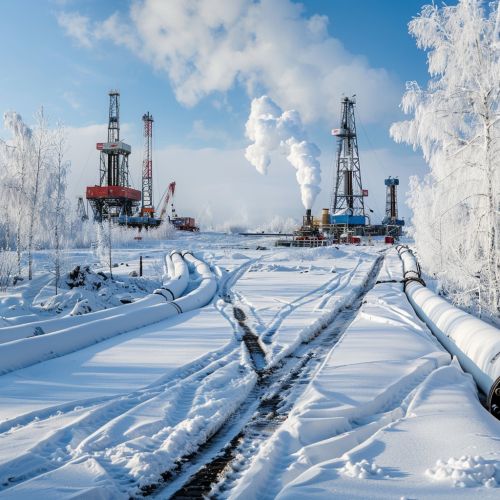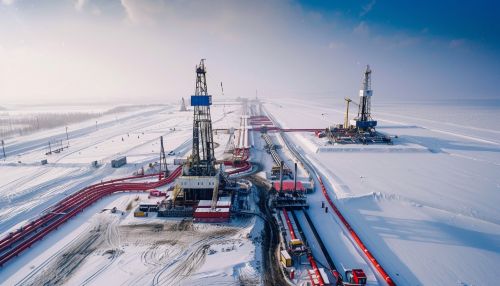Energy policy of Russia: Difference between revisions
(Created page with "== Overview == The energy policy of Russia is a critical aspect of the country's economic and geopolitical strategy. As one of the world's largest producers and exporters of energy resources, Russia's energy policy has significant implications for global energy markets, international relations, and domestic economic development. This article delves into the various components of Russia's energy policy, including its historical context, key sectors, strategic objectives,...") |
No edit summary |
||
| Line 74: | Line 74: | ||
* [[Nord Stream]] | * [[Nord Stream]] | ||
[[Image:Detail-93147.jpg|thumb|center|Russian oil field with drilling rigs and pipelines in a snowy landscape.|class=only_on_mobile]] | |||
[[Image:Detail-93148.jpg|thumb|center|Russian oil field with drilling rigs and pipelines in a snowy landscape.|class=only_on_desktop]] | |||
[[Category:Energy policy]] | [[Category:Energy policy]] | ||
[[Category:Russia]] | [[Category:Russia]] | ||
[[Category:Energy economics]] | [[Category:Energy economics]] | ||
Latest revision as of 01:10, 22 June 2024
Overview
The energy policy of Russia is a critical aspect of the country's economic and geopolitical strategy. As one of the world's largest producers and exporters of energy resources, Russia's energy policy has significant implications for global energy markets, international relations, and domestic economic development. This article delves into the various components of Russia's energy policy, including its historical context, key sectors, strategic objectives, and international partnerships.
Historical Context
Russia's energy policy has evolved significantly since the Soviet era. During the Soviet period, the energy sector was centrally planned and state-controlled, with a focus on self-sufficiency and large-scale industrialization. The collapse of the Soviet Union in 1991 led to a period of economic turmoil and restructuring, which had profound impacts on the energy sector. The 1990s saw the privatization of many state-owned enterprises, including those in the energy sector, leading to the emergence of powerful private energy companies.
Key Sectors
Oil
Russia is one of the world's leading oil producers and exporters. The country possesses vast reserves of crude oil, primarily located in Western Siberia, the Volga-Urals region, and the Arctic. The state-owned company Rosneft and the private company Lukoil are among the major players in Russia's oil industry. The Russian government has implemented policies to encourage exploration and production in new regions, including the Arctic offshore areas.
Natural Gas
Russia holds the largest natural gas reserves in the world, with significant deposits in Western Siberia, the Yamal Peninsula, and the Arctic. Gazprom, a state-controlled company, dominates the natural gas sector and is responsible for the majority of production and exports. Russia's natural gas policy focuses on maintaining its position as a key supplier to Europe while expanding its presence in the Asian markets, particularly China.
Coal
Coal remains an important part of Russia's energy mix, although its share has declined in recent years due to environmental concerns and the growth of natural gas and renewable energy sources. The main coal-producing regions are Kuzbass in Western Siberia, the Far East, and the Komi Republic. The Russian government has been investing in modernizing coal mining infrastructure and improving the environmental performance of coal-fired power plants.
Nuclear Energy
Russia is a major player in the global nuclear energy industry, with a well-developed domestic nuclear power sector and a significant presence in international markets. The state corporation Rosatom oversees the country's nuclear energy activities, including the construction and operation of nuclear power plants, fuel production, and nuclear technology exports. Russia's nuclear policy aims to increase the share of nuclear energy in the domestic energy mix and expand its influence in the global nuclear market.
Renewable Energy
While renewable energy currently accounts for a small share of Russia's total energy production, the government has set ambitious targets for the development of renewable energy sources, including wind, solar, and hydroelectric power. The Russian government has introduced various incentives and support mechanisms to encourage investment in renewable energy projects, particularly in remote and off-grid areas.
Strategic Objectives
Russia's energy policy is driven by several key strategic objectives:
Energy Security
Ensuring a stable and reliable supply of energy resources for domestic consumption is a top priority for Russia. This involves diversifying energy sources, investing in infrastructure, and maintaining strategic reserves.
Economic Development
The energy sector is a major contributor to Russia's economy, providing significant revenues through exports and supporting industrial development. The government aims to maximize the economic benefits of its energy resources by promoting value-added activities, such as refining and petrochemical production.
Geopolitical Influence
Russia uses its energy resources as a tool of foreign policy, leveraging its position as a major energy supplier to exert influence on other countries. This is particularly evident in its relationships with European countries, which rely heavily on Russian natural gas, and its growing energy partnerships with China and other Asian nations.
International Partnerships
Russia has established numerous international partnerships to support its energy policy objectives. These partnerships include long-term supply contracts, joint ventures, and investments in energy infrastructure projects.
Europe
Europe is the largest market for Russian energy exports, particularly natural gas. Russia has developed extensive pipeline networks, such as the Nord Stream and TurkStream pipelines, to supply gas to European countries. These pipelines enhance Russia's ability to bypass transit countries and ensure a more secure and direct supply route.
Asia
In recent years, Russia has been expanding its energy partnerships in Asia, particularly with China. The Power of Siberia pipeline, which began operations in 2019, is a key component of this strategy, providing a direct supply of natural gas from Siberia to China. Russia is also exploring opportunities to increase oil exports to Asian markets and develop joint energy projects with countries like India and Japan.
Middle East
Russia has been strengthening its energy ties with Middle Eastern countries, particularly in the context of the OPEC+ agreement. This collaboration aims to stabilize global oil markets by coordinating production levels among major oil-producing countries. Russia's involvement in the Middle East also includes investments in energy infrastructure and technology exchange.
Environmental Considerations
Russia's energy policy must balance economic and geopolitical objectives with environmental concerns. The country faces significant challenges related to greenhouse gas emissions, air and water pollution, and the environmental impact of energy extraction and production activities.
Climate Change
Russia is a signatory to the Paris Agreement and has committed to reducing its greenhouse gas emissions. The government has introduced various measures to improve energy efficiency, promote renewable energy, and reduce emissions from industrial activities. However, the pace of progress has been slow, and Russia continues to rely heavily on fossil fuels.
Environmental Regulations
The Russian government has implemented a range of environmental regulations to mitigate the impact of energy activities. These include standards for air and water quality, waste management, and land reclamation. Enforcement of these regulations remains a challenge, and there are ongoing concerns about the environmental performance of some energy projects.
Future Prospects
The future of Russia's energy policy will be shaped by several key factors, including global energy market trends, technological advancements, and domestic political and economic developments.
Technological Innovation
Advances in technology will play a crucial role in the future of Russia's energy sector. This includes the development of new extraction and production techniques, improvements in energy efficiency, and the deployment of renewable energy technologies. Russia is investing in research and development to maintain its competitive edge in the global energy market.
Energy Transition
The global shift towards cleaner and more sustainable energy sources presents both challenges and opportunities for Russia. While the country has vast reserves of fossil fuels, it must also adapt to the growing demand for renewable energy and low-carbon technologies. This will require significant investment in new infrastructure, regulatory reforms, and international cooperation.
Domestic Policy
Domestic political and economic factors will also influence Russia's energy policy. This includes the government's approach to energy sector governance, fiscal policies, and social and environmental considerations. The balance between state control and market-driven approaches will be a key determinant of the sector's future trajectory.
See Also
- Energy policy of the European Union
- Energy policy of China
- Global energy transition
- Renewable energy in Russia
- OPEC
- Nord Stream


